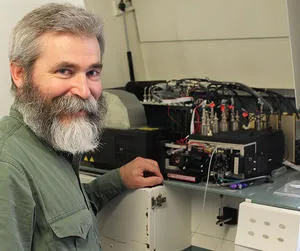
A recent study of phytoplankton by a NOC scientist has found cyanobacteria apparently remain the faster growing CO2 fixers in the oligotrophic ocean, which covers almost 40% of the Earth’s surface.
The scientific research paper by Professor Mikhail Zubkov, has been published in the Nature Communications journal. The study focuses on comparing intrinsic growth rates of cyanobacteria and algae in the mid-South Atlantic Ocean – from the equator to temperate waters.
Until now, based on theoretical and experimental studies, scientists assumed the non-scalable cellular components such as chromosomes and membranes handicap growth of the smaller cyanobacterial cells relative to larger algal cells. However this new research proves this is not the case in the open ocean.
Comparing their growth rates using an original flow cytometric 14CO2-tracer approach, Professor Zubkov found the smaller cyanobacteria actually double their biomass twice as frequently as the algae. This indicates the cyanobacteria are faster growing CO2 fixers and are better adapted to obtaining energy from sunlight and nutrients from water when living in the most extensive biome on Earth – the oligotrophic blue ocean.
The paper is called ‘Faster growth of the major prokaryotic versus eukaryotic CO2 fixers in the oligotrophic ocean’ by M.V. Zubkov (Nat. Commun. 5:3776 doi: 10.1038/ncomms4776 (2014)).
This study was supported by the UK Natural Environment Research Council (NERC) through the core funding of the National Oceanography Centre of the AMT as well as through the Research Grant NE/H005196/1, and the European Commission Seventh Framework Programme through the Green Seas Collaborative Project (FP7-ENV-2010 Contract 265294).